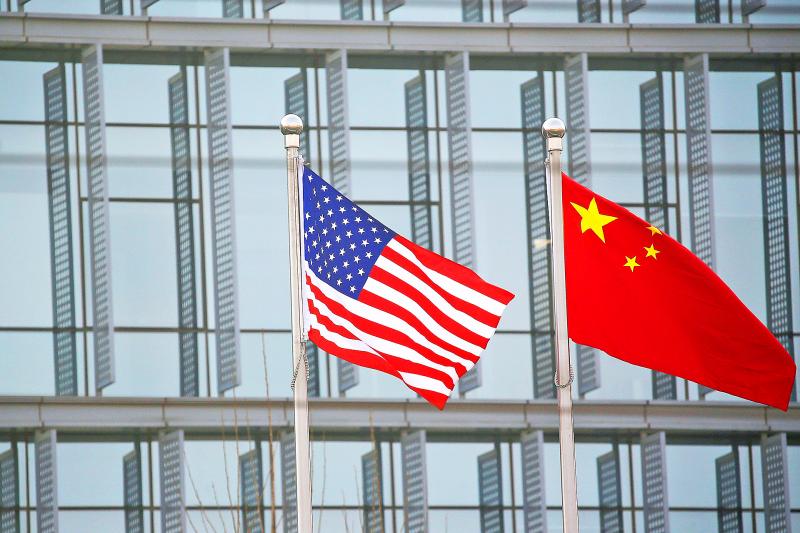Tensions between China and the US in the Indo-Pacific region are expected to intensify, the National Security Bureau and Ministry of Foreign Affairs said, recommending that Taiwan continue to emphasize its shared values and interests to encourage resistance to Chinese aggression.
US commitments in the Indo-Pacific region are expected to continue unabated despite the war in Ukraine, as Beijing takes advantage of the conflict to expand its influence in the region, the agencies said in reports delivered to the legislature’s Foreign Affairs and National Defense Committee on Sunday, ahead of a hearing yesterday on regional developments and trends.
Although Russia’s invasion of Ukraine is occurring outside Asia, it has made the world more concerned about Taiwan and cross-strait tensions, the ministry said, urging the nation to make use of goodwill to strengthen its partnerships and self-defense capabilities.

Photo: Reuters
Through bilateral and multilateral security frameworks such as the Quadrilateral Security Dialogue (Quad) and an alliance with Australia and the UK (AUKUS), the US has demonstrated its resolve to maintain regional stability in tandem with its democratic allies, the bureau said.
Meanwhile, China is planning to take advantage of COVID-19 economic recovery needs and employ cognitive warfare in an attempt to break US influence in some countries, it said, adding that the rivalry between the two powers would intensify.
ASEAN has already become a battleground, as US President Joe Biden seeks to emphasize his country’s relationship with the union, the ministry said.
At the same time, China is setting its sights on the Pacific, raising alarm that it might station troops beyond the second island chain after signing a security agreement with the Solomon Islands, it added.
As the US-China rivalry solidifies, Taiwan “has become one of the key counterbalancing factors for the democratic camp in countering authoritarian influence,” the ministry said.
Taiwan should continue to highlight its convergence of interests with like-minded nations, and align itself with the strategic goals of the Quad and AUKUS to strengthen the leverage enjoyed by the US, Japan, Australia and other key parties for the sake of regional peace, it said.
Meanwhile, at the committee meeting yesterday, bureau Director-General Chen Ming-tong (陳明通) was asked about Japan’s role in scenarios outlined in the reports.
Chen told lawmakers that Japan would be an “active player, not a spectator.”
Chen said that China’s idea of “complete” unification extends beyond Taiwan to include the Diaoyutai Islands (釣魚台), known as the Senkaku Islands in Japan. The islands are claimed by Taiwan, China and Japan.
If China militarizes these islands, as it has done with others in the South China Sea, it would pose a direct threat to Japan, he said.
This would be in addition to separate island disputes with an aggressive Russia and two other hostile nuclear-armed powers, China and North Korea, Chen said, adding that this would place Japan in an increasingly perilous position, forcing it to play a more prominent role in Pacific security affairs.

Chinese spouse and influencer Guan Guan’s (關關) residency permit has been revoked for repeatedly posting pro-China videos that threaten national security, the National Immigration Agency confirmed today. Guan Guan has said many controversial statements in her videos posted to Douyin (抖音), including “the red flag will soon be painted all over Taiwan” and “Taiwan is an inseparable part of China,” and expressing hope for expedited reunification. The agency last year received multiple reports alleging that Guan Guan had advocated for armed reunification. After verifying the reports, the agency last month issued a notice requiring her to appear and explain her actions. Guan

GIVE AND TAKE: Blood demand continues to rise each year, while fewer young donors are available due to the nation’s falling birthrate, a doctor said Blood donors can redeem points earned from donations to obtain limited edition Formosan black bear travel mugs, the Kaohsiung Blood Center said yesterday, as it announced a goal of stocking 20,000 units of blood prior to the Lunar New Year. The last month of the lunar year is National Blood Donation Month, when local centers seek to stockpile blood for use during the Lunar New Year holiday. The blood demand in southern Taiwan — including Tainan and Kaohsiung, as well as Chiayi, Pingtung, Penghu and Taitung counties — is about 2,000 units per day, the center said. The donation campaign aims to boost

The Kaohsiung Tourism Bureau audited six hotels in an effort to prevent price gouging ahead of Korean band BTS’ concert tour in the city scheduled for Nov. 19, 21 and 22 this year. The bureau on Friday said that the audits — conducted in response to allegations of unfair pricing posted on social media — found no wrongdoing. These establishments included the local branches of Chateau de Chine, Hotel Nikko, My Humble House, and Grand Hai Lai, it said, adding that the Consumer Protection Commission would have penalized price gougers had the accusations been substantiated. The bureau said the Tourism Development Act

The military yesterday said it has located the flight data recorder, or black box, of an F-16V jet that disappeared off eastern Taiwan earlier this month, and it would soon deploy a salvage team to try to retrieve it. Air Force Command Headquarters said that while it had pinned down the location of the black box, it was still searching for the aircraft’s sole pilot, air force Captain Hsin Po-yi (辛柏毅). Without providing details, the air force said it had located the black box days after detecting some intermittent signals and would now engage a team of professionals to retrieve it. The air